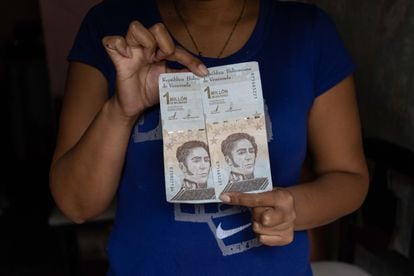A woman shows bolivar bills, this Thursday in Caracas.Ronald Peña / EFE
The Government of Venezuela has announced the second monetary reconversion in the country in three years and the third so far this century.
In a hyperinflationary framework that has been going on for four years, the operation that the Central Bank of Venezuela will carry out and will take place on October 1 seeks to remove six zeros from the currency: the million dollar bill will become a bolivar.
The occasion has been used to announce the arrival of the so-called “digital bolivar”.
“This change in the monetary scale, which is supported by the deepening and development of the digital economy in Venezuela, constitutes a necessary historical milestone at a time when the country begins to walk the path of economic recovery, after the crisis produced by the brutal attack on our economy, our national currency and the criminal application of an economic and financial blockade ”, states the Central Bank of Venezuela in a statement.
The BCV affirms that the transformation of the currency into its digital format and its use through electronic means "will facilitate the greater connection of the population with the monetary sign, despite the external attacks and the induced speculative processes."
More information
The bolívar is dying a year after the monetary reconversion in Venezuela
Venezuela runs out of cash
The economist Víctor Álvarez, who was Hugo Chávez's minister and winner of the National Science Award, maintains that this reconversion will not be the last. six zeros will be suppressed. In a year or two another will come, and seven and eight zeros will have to be removed. This will continue to happen until the structural causes of hyperinflation, which dissolves the purchasing power of the population, are corrected ”.
An opinion shared by Rodrígo Cabezas, Chávez's former finance minister and promoter of the first monetary reconversion of 2008: “It is inappropriate to initiate a process of monetary reconversion without first addressing the structural, monetary, fiscal, exchange-rate causes, which is producing the brutal increase of prices in Venezuela, and in which the Government of Maduro has a first responsibility ”.
Last year, inflation in Venezuela reached 2,900% in one year, a figure that, although it looks very high, presents a more attenuated aspect than in previous years.
The Maduro government never uses the word "hyperinflation" to refer to the overwhelming and daily increase in prices in Venezuela, the first in its entire history.
Rising prices began to spiral out of control in Venezuela in 2013, the year of Hugo Chávez's death. Then a costly and millionaire exchange rate crisis took place, dotted with disproportionate cases of corruption surrounding it, which did not want to be recognized by the new Maduro government. The crisis resulted in a huge fiscal deficit and the evaporation of most state savings funds in times of sky-high oil prices. The excessive prolongation of the exchange rate peg also caused serious damage to the national oil business. Hyperinflation has been a reality since 2016 and the exchange rate peg was repealed in 2018.
Maduro then decided to radicalize the economic program of Chavismo, expressed in the so-called Plan de la Patria, and a draconian process of hostilization to the commercial and industrial private sector came, with expropriations and temporary takeovers, sanctions and imprisonment of businessmen, which resulted in the collapse of the country's productive structure and worsening of shortages and recession.
The international sanctions on Maduro, in force since 2018, the year in which he was reelected for a second term, have aggravated the country's financial situation, hampered oil trade and any prospect of recovery.
"The digital bolivar is launched to cover the national shortage of paper money, which cannot be issued sufficiently from here, and not abroad, because it has large debts with issuing houses," says economist and financial analyst Orlando Ochoa. "The Mint can manufacture very little and the rest of the transactions are complemented with the digital bolivar and the dollars that are in the economy," he adds. The dollar has been legal in Venezuela since 2018.
This would be the fifth family of banknotes released in the eight years of Maduro's government.
The rounds of emitted parts lose value at an increasingly high speed and very quickly they are waste material, in an economy that depends as never before on plastic money, digital transactions and the existence of dollars, many of whose parts are also in short supply .
The shortage of paper money has generated social unrest on several occasions.
From 1940 to 1982, Venezuela, then one of the most stable economies in the world, got used to enjoying tiny inflation rates of 1 or 2% per year that began to gradually break down around the 1990s.
Subscribe here to the EL PAÍS América newsletter and receive all the information keys on the region's current affairs

